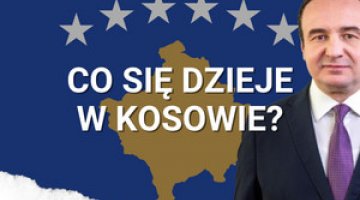The political crisis in Kosovo – the growing resistance to a deal with Serbia
The opposition in Kosovo is protesting against the deal signed in August this year with Serbia and against the border agreement with Montenegro. People took to the streets of Pristina on 28 November on the initiative of the three opposition parties: Vetëvendosje, the Initiative for Kosovo (Nisma) and the Alliance for the Future of Kosovo (AAK). The demonstration was peaceful. It was attended by around 5,000 people, although the opposition claims that there were at least 35,000 demonstrators. After the protests, the police made arrests at the headquarters of Vetëvendosje. 96 people, including one leader, Albin Kurti, were detained. The agreement signed with Serbia in August guarantees extensive rights to the union of the ten Serb communes (the Serb minority consists of 110,000 people, and the total population of the country is 2 million). These concern above all healthcare, education, spatial planning and economic development, and actions taken to this effect can be financed by the Serbian government. The union of the Serb communes (ZSO) will also have its own institutions (president, council and assembly).
Commentary
- The demonstration held on Albania’s Independence Day fits in with the number of actions taken by the opposition aimed at blocking the agreement, since it believes that it deprives the Kosovar government of control over the territories inhabited by the Serb minority and prevents the efficient governance of the state, as has been the case with Bosnia and Herzegovina. The opposition has blocked the parliament’s work (tear gas was sprayed during parliamentary sessions) and has organised demonstrations which have already deteriorated into clashes with the police. They are insisting on the agreement being examined by two judges of the Constitutional Court (chosen in consultation with the opposition) and the Venice Commission. A petition was submitted on 23 November signed by 205,000 people, thus demonstrating the extensive public support for the opposition’s demands.
- The implementation of the agreement was suspended until the Constitutional Court issues an opinion as to whether the agreement is in compliance with the constitution. However, this has not calmed the protests, since the opposition expects that the court, which backs the government, will issue a positive opinion. The fact that opposition MPs have been arrested and that parliamentary work has been resumed without the participation of the opposition may lead to a further radicalisation of the opposition. Divisions will also deepen in the country, since the marginalised Vetëvendosje is at present the party which has second largest public support in the country.
- The normalisation of Serbian-Kosovar relations, of which the August agreement was an important stage, is one of the main successes of the EU’s policy in the Western Balkans. The European integration of both countries depends on the progress they make in this process. The growing public resistance to the agreement with Serbs, with unconditional support from the USA and several EU member states, may weaken Western influence in Kosovo. Even more so, given the fact that the EU has no other incentives for the implementation of further reforms in Kosovo than the lengthy visa liberalisation process. Furthermore, the EU’s policy is becoming more and more associated with merely supporting the government, which the public views as corrupt and ineffective.



